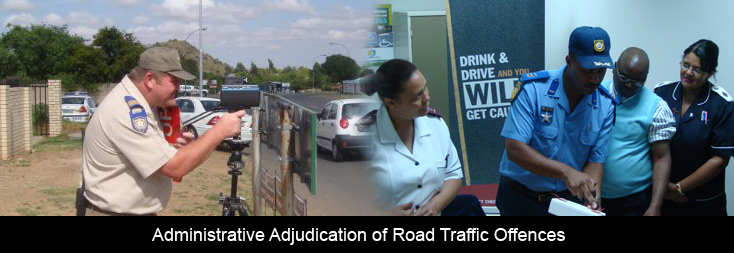Justice Project SA comments on postponement of Aarto
UPDATE: Aarto not yet delayed says Department of Transport
Justice Project Media Release:
“April fool’s day has come a month early this year. Now, the previously announced national rollout of the Administrative Adjudication of Road Traffic Offences (AARTO, not “Aarto”) Act and the long awaited commencement of the points-demerit system that goes with it, which was supposed to happen on or by 1 April 2011 has again been delayed, making AARTO a “no-go” yet again.
According to Department of Transport spokesman, Logan Maistry, “Transport Minister Sibusiso Ndebele will in due course announce the date for the national roll-out of AARTO. The Minister has not announced the date as yet. (The Minister has previously stated that we are working towards the roll-out of AARTO during the new financial year and the new financial year commences on 1 April 2011 and ends on 31 March 2012).”
Whilst some may see this repeated postponement as cause for breathing a sigh of relief, those who reside in and visit Johannesburg and Pretoria (Tshwane) are not so “lucky” as they have been subjected to almost every provision of this Act for more than three years now. The only provision that has not been proclaimed yet is the points-demerit system and this is for good reason.
The Minister continues by saying “Its implementation has seen too many confusing starts and stops which have been very confusing to the public. Sorting out these and other issues will demonstrate our commitment to the Decade of Action for Road Safety. To ensure proper coordination at national level, we will deploy some of our senior officials which will ensure that we expedite the establishment of structures and process for the management of the AARTO process.” All that we can say is that this confusion has been caused by none other than the Minister himself, the Department of Transport and the RTMC.
Invalid
But not only have citizens and visitors to the JMPD and TMPD’s operational areas been subjected to the Act itself, but they have also been subjected to the wilful and unlawful debasement of provisions in the AARTO Act and regulations which form the foundation of the AARTO lifecycle. Since 1 June 2010, the JMPD has been sending out AARTO 03 infringement notices via standard permit (or surface) mail, completely disregarding the provisions for service of AARTO documents as legislated by the Act.
This practice effectively invalidates these infringement notices, as has been stated on radio and television by acting registrar of the Road Traffic Infringement Agency (RTIA), Mr Japh Chuwe. The reason it does this is very simple and easy to comprehend in that AARTO intentionally sets a finite lifecycle for infringement notices and other AARTO processes, unlike the Criminal Procedure Act that relies on guidelines passed down by the NPA.
“If an infringement notice does not have a start date, it cannot have a date on which it can be escalated to the next level, which in its most basic form means the expiry of the 50% discount period and the issue of a courtesy letter at an additional R60 penalty fee,” says Howard Dembovsky, National Chairperson of Justice Project South Africa (JPSA).
But since June 1, 2010 and to present day, the JMPD has continued to send out AARTO 03 infringement notices, which further bear no date of issue on them by standard mail. The TMPD/RTMC did similar for a short period in August 2010, but soon reverted to the prescribed registered mail means of service and continues to do so now.
Unlawful
As if this were not enough, the JMPD now also fines foreign driving licence holders at three times the penalty (fine) amount, despite the fact that provision for tripling fine amounts only exists for juristic persons under the AARTO regulations – in return for no demerit-points being applied to the company or other juristic entity representative’s driving licence.
When this matter was addressed with the RTMC and the JMPD, Director Gerneke stated in his response that an opinion offered by the Chief State Law Advisor with respect to applying penalty values of three times the normal penalty could be practiced against juristic persons gave him the right to do similar to foreign driving licence holders. This despite Senior Executive Manager of the RTMC, Basil Nkhwashu stating in no uncertain terms that there is no provision in the AARTO Act or regulations that makes provision for this.
Fabricating legislation
Further to levelling and acting on threats to the public, Director Gerneke has stated that “Due to 80 percent of all registered mail not being picked up at post offices, we are in the process of having the legislation changed. In future AARTO fines will not be sent by registered mail.” (Sandton Chronicle week ending 1 October 2010.)
No such amendments have been tabled or published for comment to date, yet the JMPD merrily continues saving R15 per postage item in their relentless pursuit of revenue (and cost savings attached thereto). The triple fine values to “foreigners” is yet another example of how Director Gerneke has unilaterally elected himself as South Africa’s chief legislator and parliamentarian, despite the fact that he is neither.
Threats
Despite Mr Chuwe openly and publicly stating that the JMPD’s unlawful service of AARTO 03 infringement notices invalidates them, Director Gerneke’s open and public standpoint is that it does nothing of the sort. In an article published in the Sandton Chronicle of 1 October 2010, he stated “The 02-4024 infringement notices must be paid and motorists who have not done so will be inconvenienced at roadblocks.”
The term “inconvenienced” can easily be translated to “unlawfully detained or arrested and/or forced to pay these outstanding infringement notices”, even though the Act and regulations have very clear with respect to collection mechanisms and none of these make provision for collection by coercion at the roadside or indeed, arrest.
But so effective has the strategy of staging fine collection roadblocks been for a decade now in the case of the JMPD, that motorists now automatically associate a traffic fine with arrest and abuse by traffic authorities. Motorists who fall victim to this type of behaviour submit very quickly and in many instances, rush off to pay their fines rather than facing the prospect of being arrested or “inconvenienced” in roadblocks. They simply do not and cannot be expected to know if the fines they were issued were lawful or not.
Toothless
The RTMC and RTIA have alleged to JPSA that they had instructed the JMPD to cease sending out AARTO 03 infringement notices via unlawful means as far back as August 2010, yet the practice has continued unabated to date and shows no sign of ceasing.
Similarly, the determination that fining foreign driving licence holders three times the penalty amounts is not catered for in the Act and regulations has met with no cessation of this practice by the JMPD.
According to Logan Maistry “At the three-day Transport Lekgotla held in Cape Town from 24 to 26 February 2011, Minister Ndebele said: ‘….Putting the RTMC in order is one of the urgent tasks facing us as the transport sector and one which presents us an opportunity to demonstrate coordination in action’.”
It would appear that the Minster’s statement is ominously true and that the mandate of overseeing the AARTO process must be better defined and proper authority granted to the RTIA to act where issuing authorities violate provisions of the Act as well as effectively hiding their income and activities from the Agency and the RTMC. Of course, this would require that the RTMC’s own house be put in order.
Litigation
JPSA has announced its intentions to take the matter to court and this will happen at some time in the future, but as straight-forward a process as this may appear to be, access to justice is a luxury of only the rich in South Africa. In reality JPSA is not a rich organisation and it therefore has to rely on the goodwill of legal professionals and firms that are willing to act on its and the public’s behalf on a contingency basis.
The RTMC and JMPD know this full well and continue to take full advantage of it, knowing that the Department of Transport and Minister Ndebele will not intervene because they are simply not interested in how AARTO is in fact being implemented unlawfully.
JPSA has made several representations to the RTMC, RTIA and Department of Transport as far back as July and August 2010 and has received little other than agreement from the RTIA that it is largely correct in its determinations. The RTIA and the RTMC have however done nothing to halt the JMPD’s unlawful behaviour, despite several promises to do so.
In return for JPSA’s announcement of its intention to take these matters to court, the RTIA has effectively said “go right ahead”, assuming that this will not happen. JPSA’s resolve in this matter is very strong and steadfast and even if it takes us a decade or more to get this matter into court, we will do so and in the meantime the prejudice is mounting by the day.
Extent of prejudice (compounding)
It is estimated that well over a half a billion Rand has already been collected by the JMPD and the fact that they have done so on unlawfully constituted traffic fines is going to mean that they will have to pay all of this money back to those from whom they have collected it.
The age-old argument of “people have admitted guilt” by paying will not wash, given the fact that it is impossible to admit guilt to something that is not definable as lawful prosecution in the first instance.
Imposing AARTO on South Africa
If the current “problems” with AARTO are not addressed, either by a court action or the Minister of Transport taking responsibility for his soon to be “teenage” legislation then it is abundantly clear that it will end up being one of the most monumental disasters that South Africa has ever seen – in transport anyway.
The AARTO Act was enacted in 1998 and will therefore be 13 years old this year. It has been thrust upon the Cities of Tshwane and Johannesburg with little thought and care and simply saying that “issues identified by the pilot projects (July 2008 to 31 March 2010) have been dealt with” as was stated by Mr Basil Nkhwashu to IT Web does not cut the grade.
It is what has happened since the end of the “pilot implementation” that has raised the problems to a whole new level of incompetence and maladministration that has a significant bearing on just how effective and equitable this legislation is going to be.
In his reply to me, asking for clarity on the matter of the further postponement and how the issues had been dealt with, Mr Basil Nkhwashu stated “I have not seen the [IT Web] article yet and I have no idea about the implementation being delayed as the Minister has not issued any statement saying the implementation has been delayed. I did say that that we have sorted the issues that were identified as challenges in the pilot assessment report, e.g. the some of the banks are now linked to e-eNatIS, the NCR is now fully functional.”
Oh my goodness! Doesn’t one have to ask: if the tail does not know what the head is saying, then is it any wonder that the RTMC has been labelled as “dysfunctional”? As for the “pilot assessment report” – it would be nice if interested parties could see this seemingly top secret document sometime.”
References:
- Statement from Mr Logan Maistry – Department of Transport.
- http://www.itweb.co.za/index.php?option=com_content&view=article&id=41589:aarto-delayed-again&catid=118.
Contact: Howard Dembovsky – National Chairman, JPSA Email: howard@jp-sa.org
Also view:
- Aarto Made Easy
- Corruption Traffic Enforcement and Road Safety
- Aarto Presentation
- Aarto in a Nutshell
and on this Blog:
Aarto concerns raised by Justice Project South Africa




